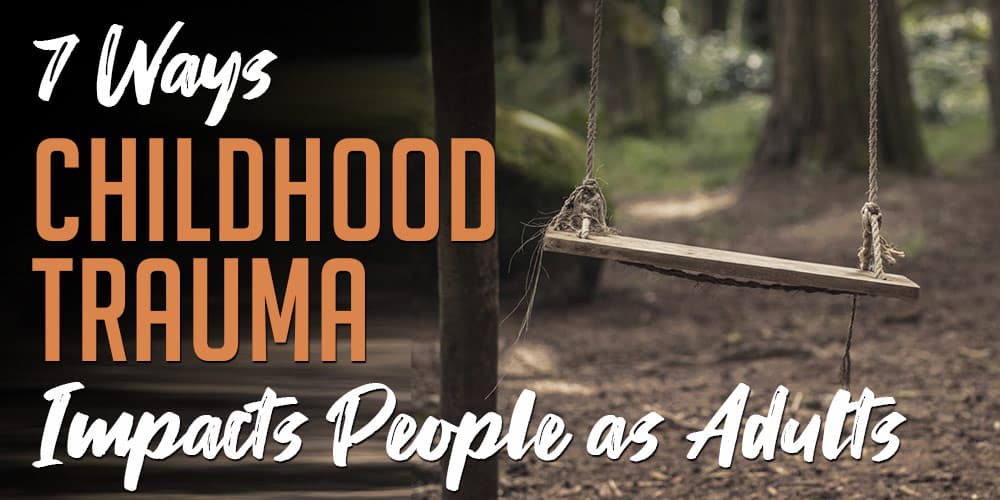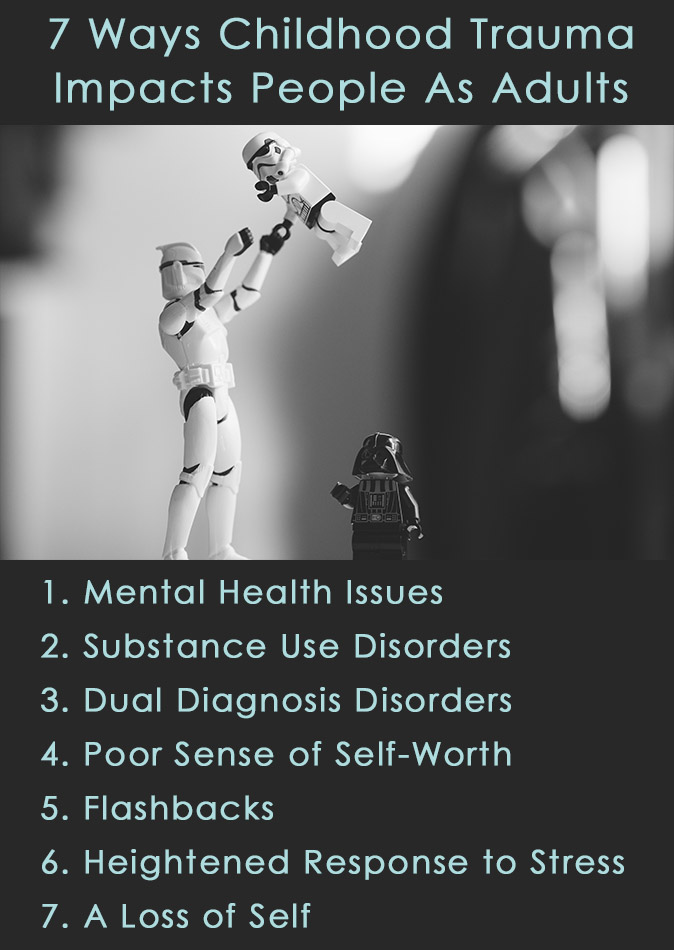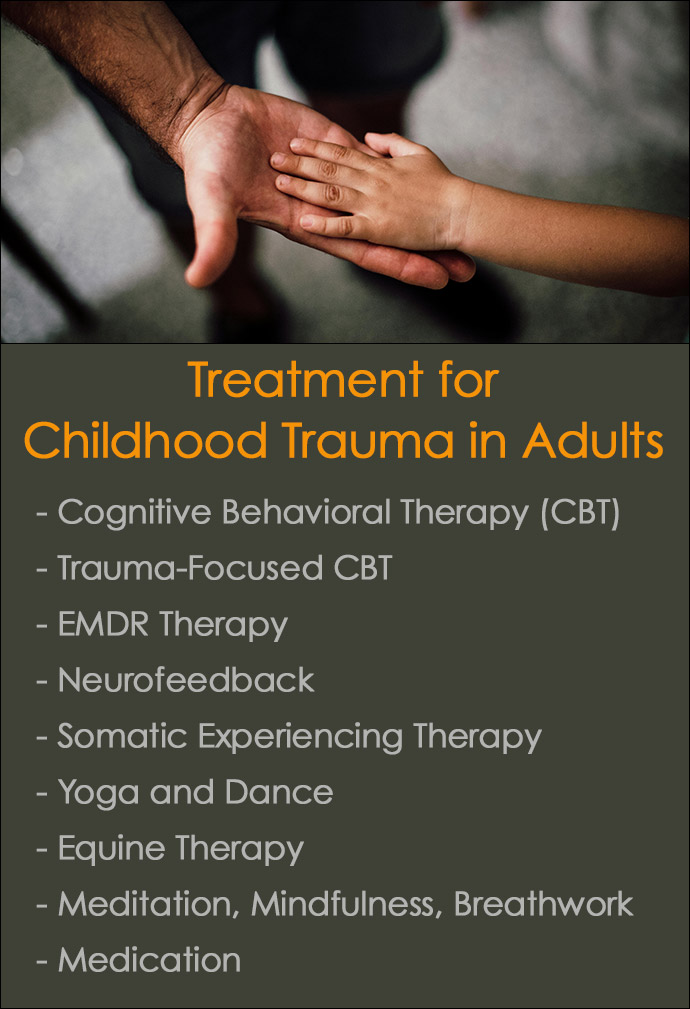
The effects of childhood trauma in adults can have a lasting impact on personal relationships, as well as an individual’s physical and mental health.
If you ask a group of people for the definition of “childhood trauma,” the answers are likely to vary widely because trauma usually doesn’t occur from simply an isolated or single event.
It often results form a prolonged series of emotional or psychological events. Left untreated, childhood trauma can affect a person’s mental wellbeing long into adulthood.
The National Child Traumatic Stress Network (NCTSN) notes that the age a child experiences or witnesses a traumatic event can have an influence on the way they interpret it. And trauma at an early age can last for a very long time.
The are many causes and symptoms of trauma disorders that are unique to each individual.
Common Causes of Trauma
- Neglect
- Sexual assault
- Bullying
- Physical or emotional abuse
- Domestic violence
- Painful medical procedures
- Loss of a loved one
- War trauma
- Natural disasters
- Homelessness
- Chronic poverty
- Isolation and loneliness
Experiencing trauma as a child or witnessing a traumatic event can leave a lasting impression that remains long after they become an adult.
Children can be good at hiding the symptoms and many are afraid to talk about the pain they are feeling, so the effects of trauma are never fully processed.
Some repress the memories or become stuck in a state of learned helplessness as a coping mechanism to avoid confronting the trauma.
Avoiding the events or not being able to talk about them with supportive and caring adults can lead to isolation, which is an often-overlooked cause of trauma in children.
In the book, “Can America Recover: Reimagining the Drug Problem,” the authors Evan Haines and Bob Forrest note that isolation can be a bigger cause of trauma than the traumatic event itself.
The unresolved symptoms of childhood trauma in adults may become worse over time and develop into serious mental health issues later in life.
Symptoms of Childhood Trauma in Adults
Because each person and traumatic event is unique, the symptoms of childhood trauma in adults will differ for each individual.
The symptoms can manifest as physical, emotional, behavioral, or a combination of all three.
Common Trauma Symptoms Include:
- Anxiety or depression
- Mood swings
- Low self-esteem
- Trust issues
- Feelings of shame or guilt
- Risky behavior
- Self-harm
- Relationship difficulties
- Avoidance of people or places
- Chronic pain
- Insomnia or sleep problems
- Memory issues
- Dissociation or loss of identity
- Fear of intimacy
- Codependency
- Substance use or addiction
- Suicidal thoughts
- Eating disorders
- Post-Traumatic Stress Disorder (PTSD)
The effects of childhood trauma can lead to Post-Traumatic Stress Disorder in adults. Just as there are various forms of trauma disorders, there are also different types of PTSD.

7 Consequences of Childhood Trauma in Adults
1. Mental Health Issues from Childhood Trauma in Adults
Surviving childhood trauma leaves emotional and mental scars that often translate to battles with chronic depression as an adult, anxiety disorders, and post-traumatic stress disorder (PTSD).
Without confronting the trauma through therapy, the symptoms of these disorders have the ability to wreak havoc on a person’s personal and professional life, as well as their physical health.
2. Substance Use Disorders (SUDs) and Addiction
Research has found there are “strong links between childhood traumatization and substance use disorders or addiction.”
In many cases, people begin self-medicating with alcohol and drugs as a coping mechanism without even being aware that it may be a result of the trauma they experienced as a child.
3. Dual Diagnosis Disorders
A dual diagnosis or co-occurring disorder is the presence of a substance use disorder combined with mental health issues, such as PTSD, depression, and anxiety.
Each disorder can have a negative impact, or even amplify the symptoms of the other, and unless both disorders are simultaneously addressed with dual diagnosis treatment, it’s difficult for many people to recover.
4. Poor Sense of Self-Worth
Trauma can strip people of confidence, especially children. A lifelong lack of confidence can lead to a person believing they are not worthy of stable relationships, good health, or a successful career.
An unhealthy lack of self-worth can translate to a life filled with feelings of isolation, loneliness, and a general sense of despair.
5. Flashbacks
Survivors of childhood trauma who have not learned how to cope with triggers that bring back the memories of their trauma are sometimes unable to stop reliving the horror of their experiences.
Flashbacks to childhood trauma in adults are like reliving the event over and over, which can be absolutely crippling.
6. Heightened Response to Stress
While some survivors might not struggle with flashbacks, they may have unhealthy responses to stressful situations, such as difficulty relaxing, an aversion to loud noises, or being jittery or jumpy in some social situations.
Stress is a normal human response experienced by everyone in certain circumstances, but for adult survivors of childhood traumatic events, it can be much more pronounced and debilitating.
7. A Loss of Self
The effects of childhood trauma on adults can cause a person to become vulnerable and struggle with a sense of identity or feel they need to be a different person in specific settings. Some might even believe that they don’t have a real sense of who they are.
This can lead to an inability to experience joy that makes it extremely difficult to maintain healthy relationships, keep a job, and satisfy nagging feelings of insecurity.

Treatment for Healing Childhood Trauma in Adults
Overcoming a traumatic event at any age is challenging, but childhood trauma in adults can be overwhelming and especially problematic. Seeking trauma counseling is an important step that is essential for healing.
It’s necessary to address the symptoms as well as the root causes of trauma with psychotherapy, support groups, physical body therapy, lifestyle changes, and sometimes medication for anxiety or depression.
If a substance use disorder is present, seeking dual diagnosis treatment is highly recommended to treat addiction and mental health issues at the same time.
Without confronting the addiction and mental health aspects together, recovery might not be successful.
Effective Methods for Treating Childhood Trauma in Adults
Cognitive Behavioral Therapy (CBT) helps to identify and change negative thoughts and behaviors.
Trauma-Focused Cognitive Behavioral Therapy uses CBT techniques to process traumatic memories and teaches healthy strategies for coping with past trauma.
Eye Movement Desensitization and Reprocessing, also known as EMDR Therapy, is a unique form of treatment used for PTSD to help process and integrate traumatic memories.
An EMDR therapist uses bilateral stimulation with eye movements to recall distressing images, and over time, the impact of the traumatic memories is lessened. This form of therapy also works well for anxiety and other conditions.
Neurofeedback allows a person to watch their brainwave activity in real-time on a computer screen. As treatment progresses, they learn how to positively change negative thought patterns that may be causing trauma-related stress and anxiety.
Somatic Experiencing Therapy is a body-focused method of somatic healing for trauma. Trauma is often stored in the body, and this approach helps to release the traumatic pain from the body.
Yoga and dance are other body-based therapies that can help process the physical pain of trauma and PTSD.
Equine Therapy allows individuals to work directly with horses for reducing the symptoms of PTSD and trauma. Working with horses is more comfortable for some individuals who have trust issues relating to people.
Holistic therapies like meditation, mindfulness, breathwork, and acupuncture have shown to be beneficial for healing childhood trauma in adults.
Medication will not directly treat trauma, but it can be beneficial for alleviating symptoms caused by trauma, like depression or anxiety.
Getting started is the hardest part of trauma treatment, because many people feel vulnerable discussing their past. Others might be unaware of their personal issues because they have mentally blocked out the traumatic events.
It’s important to be open and honest during treatment and rely on the support and guidance of the doctors and therapists.
Over time, it will become easier to confront traumatic memories, experience them from a new perspective, and openly share thoughts, emotions, and feelings with another person.
This is all part of post-traumatic growth, and the goal is not only to heal, but also to thrive in recovery. Knowing that recovery is possible will positively reinforce childhood trauma survivors to seek treatment as an adult.
Frequently Asked Questions
Does Childhood Trauma in Adults Cause Personality Disorders?
Yes, childhood trauma can cause personality disorders in adults due to impaired emotional regulation, trust issues, and problems with relationships.
Some of the most common personality disorders related to past trauma include Borderline Personality Disorder, Antisocial Personality Disorder, and Histrionic and Dependent Personality Disorders.
How Many Adults Suffer From Childhood Trauma?
It’s difficult to know the exact number of adults who struggle with childhood trauma because many people hide their pain, but the prevalence of childhood trauma in adults is probably much higher than many people realize.
Approximately 60 percent of American adults experienced at least one Adverse Childhood Experience (ACE), and more than 15 percent of those surveyed have experienced four or more different types of ACEs, according to the National Foundation to End Child Abuse and Neglect.
What Impact Does Childhood Trauma in Adults Have on Relationships?
Childhood trauma can have a negative effect on adult relationships most commonly in the form of trust issues, and a fear of intimacy or abandonment.
Because of this, some childhood trauma survivors avoid getting close or intimate with others for fear of failed relationships.
How is Childhood Trauma in Adults Diagnosed?
Diagnosing childhood trauma in adults involves a comprehensive assessment using screening tools like the Adverse Childhood Experiences (ACEs) Questionnaire, and clinical evaluations such as the Trauma Assessment for Adults (TAA).
The Diagnostic and Statistical Manual of Mental Disorders (DSM-5) provides specific criteria that is used for diagnosing trauma disorders and PTSD.
Symptoms to look for during an assessment include the presence of anxiety and depression, emotional dysregulation, dissociation, attachment issues, substance abuse, engaging in risky behaviors, social withdrawal, and other signs.
Related Posts
- 5 Types of PTSD and Treatment Therapy
Anyone can experience post-traumatic stress disorder symptoms and recognizing the different types of PTSD will…
- Somatic Experiencing Therapy for Trauma Healing
Trauma or PTSD can be debilitating for many people, but fortunately a form of Somatic…
- 25 Celebrities and Famous People With OCD
As common as it is in society, it should come as no surprise that there…
